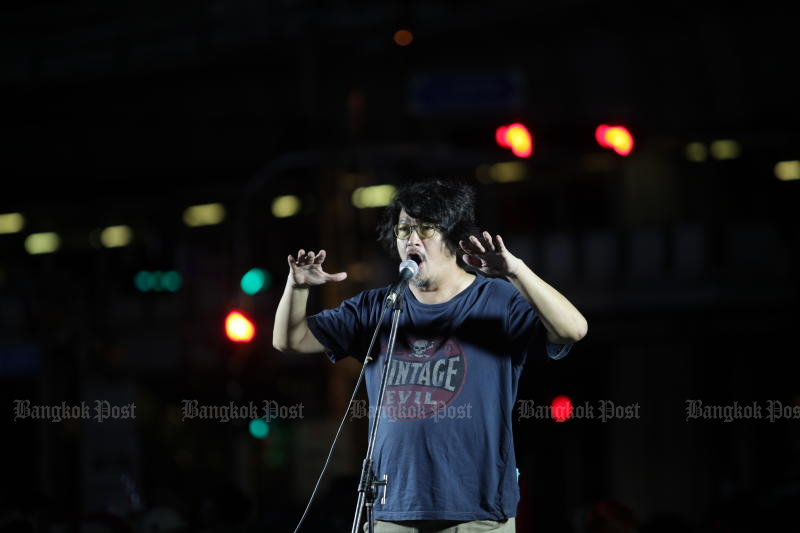
Despite the severe Covid-19 situation in the capital, the pro-democracy movement has ramped up its campaign in recent months, with mobs taking to the streets almost on a daily basis.
One of the key players behind the growing movement is none other than seasoned political activist, Sombat Boongamanong.
Having worked as an activist since he began his career 30 years ago, the 53-year-old Sombat, also known as "Nooring", is now a prominent figure in political activism.
Mr Sombat was at the forefront of the protests against the 2006 coup staged by then-army chief, Sonthi Boonyaratglin, which led to the downfall of former prime minister Thaksin Shinawatra.
In the years following the 2006 coup, he was known for his colourful and creative style of activism -- but in the most recent chapter of Thailand's political struggle, he has once again taken to the streets to take a leading role in rallies against the Prayut Chan-o-cha regime.
"We are at a crucial moment in democracy development," he told the Bangkok Post.
"This is a time when the ruling authoritarian establishment is trying to suppress the young, democratic generation."
Since last month, Mr Sombat has led multiple "car mobs" in drive-by rallies across the capital, a new strategy of protesting during the Covid-19 pandemic. Last week, he staged a prolonged protest at Asoke intersection to demand Gen Prayut's resignation as PM.
Despite his renewed activism, he isn't exactly a new face in Thai politics. He began his foray into political activism in 1991, after the National Peacekeeping Council (NPKC) seized power from Chatichai Choonhavan's civilian government.
"I was among the very few back then who stood up against the coup -- way before political groups started joining the anti-coup movements and the situation escalated into the Black May incident in 1992," he said.
"While the government's tactics to suppress democratic opposition have largely remained unchanged, I can say the nature of social movements has changed -- because more people, especially younger generations, respect democratic values.
"They do not tolerate authoritarianism."
He said Thailand actually experienced democratic governance under former PM Thaksin, but the coup which overthrew his administration in 2006 effectively rolled back any progress that was made under his regime.
"Yes, the administration under PM Thaksin was not perfect, but overthrowing any democratically-elected government with military force is unacceptable. So, I decided to resume my role again as an anti-coup activist," he said.
Even though the Council of National Security (CNS), the regime set up after the 2006 coup, was relatively short-lived, Mr Sombat said the regime under the National Council for Peace and Order (NCPO) and the civilian government under Gen Prayut which followed it were a continuation of the patterns established after the 2006 coup.
"So here we are again. It is a clear effort by the authoritarian regime to suppress democratic opposition by any means possible, to stay in power as long as possible," he said.
When asked about his colourful approach to political protests, Mr Sombat said it was intended as a mockery of the intense clashes between those in power and the democratic opposition.
In 2018, for instance, he turned up on a rally stage with a colourful costume to announce the establishment of the Kian -- or "Jackass" -- Party.
"I actually don't want to be a politician. It was just a tactic to draw people's attention to politics, and make politics a little less serious," he said. "I want to push for a fun political movement.
"Creativity is our strength. We can't solely rely on traditional strategies, as they know how to deter those. We have to come up with new, creative ways to draw people out and keep up with challenges."
He admitted the Covid-19 outbreak is a major hindrance to political activism, so he came up with the "car mob" idea to allow the people to gather safely in public.
When asked to explain why he chose the path of being a political activist, Mr Sombat insisted he wasn't seeking to be the leader of a democratic movement.
Instead, he said, it is his duty as a good citizen in a democratic society to defend its values and institutions.
"I believe that everyone has a duty. As a member of society, it is upon us to make the world we live in a better place for future generations," he said. "But this does not mean that we can just wait and do nothing."